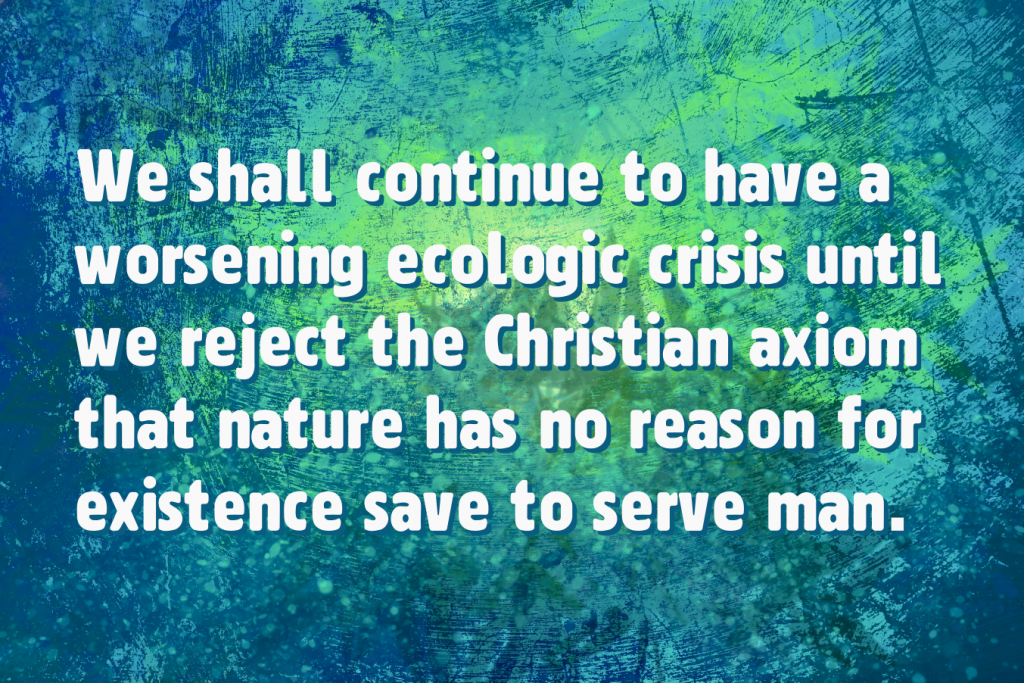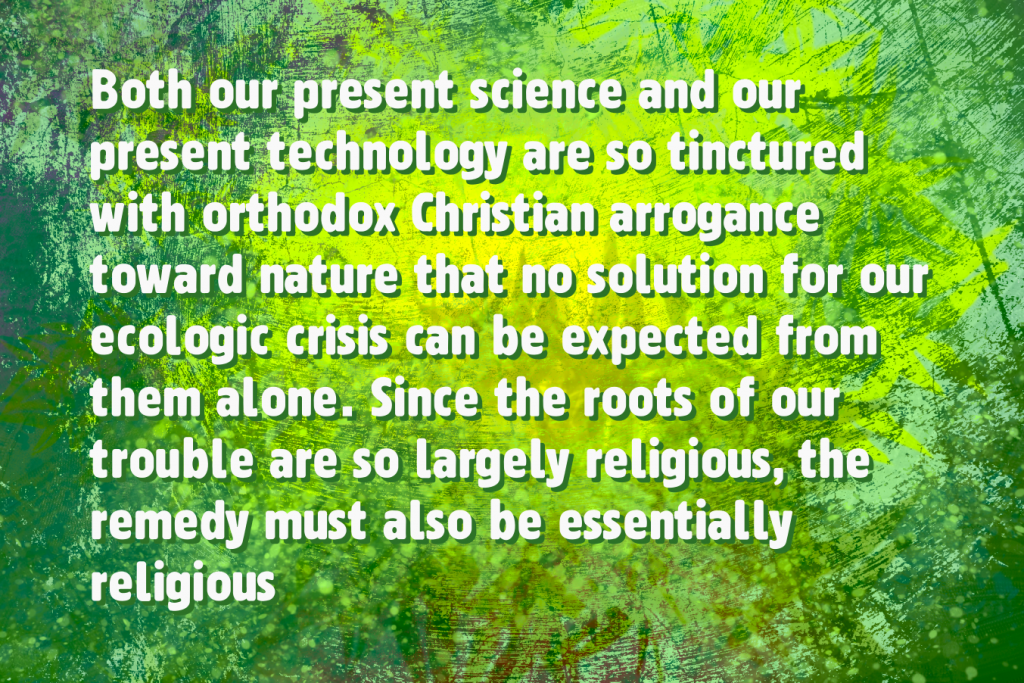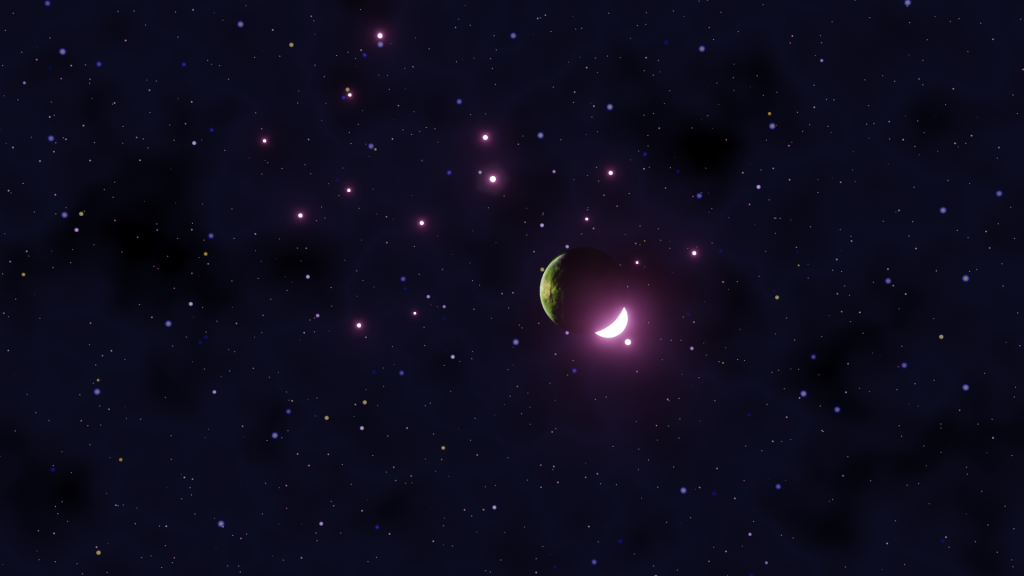The Historical Roots of Our Ecological Crisis
Lynn White got one big thing right. The environmental mess is Christianity’s fault. We can blame religion, yes Christianity, for allowing us to plunder the land, seas, air, and animals. Our religion has fostered in us a mindset that makes an ecological crisis, notably climate change, unavoidable. And importantly, if religion is at the heart of the problem, so is religion at the heart of the solution.
Readers may recognize that I’m referring to the ground-breaking paper, “The Historical Roots of our Ecological Crisis.” Not only was Lynn White’s paper a sensation in the late 1960s when he published it, but it continues to attract attention. It’s one of those staple documents that has never grown passe. We’re more than half a century beyond its appearance, its author has died, yet I see it repeatedly in footnotes, bibliographies, and required reading.

Lynn White wrote HREC in 1967 when he was teaching medieval technology at UCLA. He must have possessed a Merlin-like gravitas in those days. He was 67 and had a resume that included stints at Princeton and Stanford. And, significantly, Union Theological Seminary. He published this famous essay in Science Magazine even though it was more about history and theology
The nine-page article bristles with dazzling details about everything from domesticated rabbits in medieval England to plow design in Germany. By the end of the first paragraph, the reader feels overwhelmed by the author’s intellectual virtuosity. This essay gives the impression that it has unlocked the secret to Europe’s societal preeminence, which is that we Westerners have acquired an ethos of ambition that has made us work a little bit harder, grab a bit more, and feel a little less remorse for the byproducts of our enterprise. This pitiless treatment of nature began in Medieval Europe and jumped across the Atlantic where it remains as the secret to America’s standout wealth and power.
White was writing in 1967. Those were days when it was easy to assume that Western Civilization was human history’s leading edge. White’s picture of human history, at least the important part, originated in Greece, Rome, and Palestine, then pressed into Europe, and finally jumped over the Atlantic to America. Even children growing up in the 1960’s didn’t need to take one of White’s classes before they picked up on the idea of American cultural exceptionalism. Beginning in 1961, kids needed only to turn on their television sets to watch the American space program produce one successful space flight after another.
Unfortunately, winning wasn’t the only reality that confronted Americans in the 1960s. All the economic and technological advances came with a nasty byproduct, namely, destruction of the natural world. Rachel Carson published The Silent Spring in 1962. The book jolted the United States and the World into a new and uncomfortable consciousness. The world was not infinitely forgiving of development.
Ultimately, then, White is writing to bring to light the single factor that underlies Western society’s advance and its shameless plunder of the natural world.
That factor is Christianity.
Now, by pointing an accusing finger at Christianity, White isn’t thinking that priests, pews, and piety launched the Gemini rockets. Americans don’t have air conditioning because they pray. White is saying that biblical religion has fostered a mindset that strips nature of its divinity and lets people exploit the world with abandon.
He’s talking about assumptions that even seep into people who aren’t religious. Parents give their Cub Scout son a hatchet and then turn a blind eye when he hacks chunks out of trees in the park. The agnostic who doesn’t go to church nevertheless still holds the uncritical belief that progress always wins and history is going to end well. The belief that history is getting better and better tends to ease the conscience of the capitalist whose business dumps toxins into a stream. He doesn’t get too worried. “Hey, everything turns out okay!”

Christianity has shaped more than a just a mindset. When Christianity is most energetic, say at the Billy Graham revival or when predicting Christ’s second coming, the rocks and trees, skies and seas, take a back seat in the believer’s priorities. The piety of the saved soul reasons that getting someone redeemed is God’s top priority. Earthworms and catfish are fine. But what are these in comparison to living for eternity with Jesus?
The Christianity that White knew was all about the individual. How do I get to heaven? How do I stop sinning? In White’s Christianity, the natural world is like the spent first stage of a rocket. Its whole point is to lift the soul-payload and then fall back burned and dead.
Lynn White drags biblical religion into the sunlight of intellectual common sense and asks, “Do we really want to keep believing this way?” Our faith has given us ideas that have made us powerful and rich, but do we still believe this way?
He names these ideas: victory over paganism, linear rather than circular history, and so on.
As I read the specific ideas to which White was referring, I became increasingly uncomfortable with the cartoonish quality of these characterizations of Western religion, even by 1967’s standards. And by today’s standards these generalities are downright suspect.
Put differently, White rightly understands what Christianity had and has become in the western world. But he fails to acknowledge, as does the whole of Western Christendom, that these qualities of western religion are not really what the Bible says. They are unsupported by a careful reconsideration of the creation texts in the Bible, not to mention historical examples of a more earth-friendly faith in non-Western places.
White has No Solution
Let’s go back to “The Historical Roots of the Ecological Crisis.” White’s essay gives no satisfying solution. His spectacular opening, which credits to Christianity the blame for environmental catastrophe, fizzles out by essay’s end. White’s conclusion hints that if we’re going to continue to be Christian then we’re doomed. He doesn’t believe, for example, that science and technology will innovate its way out of the mess. He’s dubious of switching religions. One pathetic sentence makes explicit the extent that he is grasping at straws for a solution.
The beatniks, who are the basic revolutionaries of our time, show a sound instinct in their affinity for Zen Buddhism, which conceives of the man-nature relationship as very nearly the mirror image of the Christian view. Zen, however, is as deeply conditioned by Asian history as Christianity is by the experience of the West, and I am dubious of its viability among us.
Saint Francis, Really?
White ends his essay with a painfully weak recommendation. He calls to mind the Medieval saint, Francis of Assissi and his tender relationship with animals. Francis can serve as the “Christian” alternative. The reader gets the impression that in all biblical religion, Francis of Assisi is the solitary voice that prized the animal world and serves as the example of an earth-friendly faith.
This mighty essay ends with a whimper: “I propose Francis as a patron saint for ecologists.”
What never occurs in this luminous essay is the idea that Francis gets it right because of his vigorous spiritual life, which enjoys a deep connection with God’s ways. Neither does it occur to White that the Christianity which had caused so many problems had strayed away from its biblical foundations.
It may seem that I’m trying to slam Lynn White and defend Christianity. This is not the case. His is a bold and useful essay. His incisive writing deserves the acclaim that is evident in its continued relevance. Neither is it my interest to defend Christianity for its role in undergirding the despoiling of the environment, a problem that has taken on apocalyptic proportions today.
What I’m trying to point out is that the Christianity of White’s generation was limited.
Put more sharply, the prevailing ideas about creation that White inherited were woefully skewed. This is why White could scan the whole history of Christianity—at least what was available to him—and not be able to find anything other than St. Francis to exemplifies a creation-friendly approach. This is also why White could, without pushback, cite deficiencies in Christianity which were in fact egregious misreadings of the Bible’s theology of the Creation.
The correction in the church’s understanding of Creation was under way as Lynn White wrote this article. Beginning in 1970, Old Testament scholars began to confront the fact that western Christianity had not focused on creation for a long time. And they set to work exploring it freshly.
In 1971, the prominent systematic theologian, George Hendry, declared that creation was “eclipsed. There followed a flurry of books from people like Bernard Anderson, Terrance Fretheim, and Jurgen Moltmann. At last, creation began to enjoy fresh attention. The church world was following the scientific world in its awakening to the problems of pollution and the destruction of the natural order.
The insights that these scholars brought to the surface about the Genesis creation accounts and what biblical faith thought about nature would modify what Lynn White took to be established opinion.
Today, one reads “The Historical Roots of our Ecological Crisis” wincing at many phrases, which scholars and church goers alike in 1967 thought to be unimpeachable insights.
What Exactly Did White Cite as Problems in Christian Faith?
Below I’ve listed all the statements White makes in his essay that supposedly represent established biblical principles concerning the world and humanity’s place in it. I’ve followed each of these by what I believe to be a more adequate interpretation of biblical truth. My rejoinders to these principles are all drawn from that theological ferment and publishing boom that started at the time that White wrote.
- “Faith in perpetual progress.” It’s true that biblical religion is linear and envisions a glorious end. But the idea of progress as a property of the world fits awkwardly with a biblical creational theology. There is the prospect of New Creation which lies at the end of history. But the course towards the New Creation is an open one. Progress depends on a holy partnership between humanity and the Creator. Failure is an option. Certainly the Genesis flood is an appalling failure and represents de-creation as a result of human wickedness. A better expression for “progress” would be “continual creation.” A careful reading of the Old Testament reveals that the Creator continues to create with the outcome not inevitable. Before we foul the atmosphere and cut down forests we would do well to remember an oft-repeated, but little remembered, biblical principle: human malfeasance has a massive impact on the created order. Progress is not guaranteed.
- “The Visible World had a beginning.” White asserts this as if the invisible “spiritual” world always existed. This expression exposes White’s dualism. The invisible world also had a beginning. “In the beginning God created the heavens and the earth.” Biblical faith brings heaven and earth into close relationship rather than separation. White assigns significance to Christianity’s defeat of paganism, which saw nature bursting with soul and spiritual significance. Biblical religion holds a similar view, which sees the entire world as interpenetrated by God and in a love relationship with God. Panentheism comes closest to expressing the biblical view. The key in biblical faith is the love relationship that God holds for humanity and the non-human world.
- “God planned this all for man’s benefit and rule” White sees Christianity too much as hierarchical and dualistic. Humanity’s vocation is one of being made to be in God’s image and like God. Following the Creator’s example people share with the God responsibility for the Creation. The assignment given to humanity is God delegating a portion of the creative work to people. Like the Creator God, people are to nurture all things. Upon creating humanity God gives them their assignment: “be fruitful, multiply, fill the earth, have dominion, subdue the earth, keep and till (serve) the garden, name the animals” and so on.” On balance these divine functions, which advance creation rather than exploit it, are the core parts of each human’s job description. This is much more serious than, “The world is your oyster, do with it as you please.”
- “Man’s body is made of clay but he is not simply part of nature, he is made in God’s image. Christianity established a dualism of man and nature.” The assumption in such a statement is that God exists at some distance from what God has created and pulls humanity away from the world. In Genesis and beyond the idea of creation moves beyond simply bringing stuff into existence. Much in the “creation stories” is devoted to God, divine beings, humanity and creation itself, continuing to organize and perfect creation. There’s a cooperation and mutual sharing in this work which warrants saying that creation is ongoing. This work continues in the Christ event when one might say that God’s body is made of clay and he is part of nature and is made in God’s image.”
- “Insisted that it is God’s will that man exploit nature for his proper ends.” First, “exploit” is not a biblical word or concept. In the first two chapters of Genesis, humanity is given a general vocation to mirror God’s care and love for creation by filling the earth, subduing it, having dominion, keeping, conserving, naming the animals, and so on. To say that the biblical calling of humanity is to exploit the world is an overstatement.
- “Christianity had angels and demons inherited from Judaism.” This is correct. The ministry of Jesus is replete with both angels and especially demons. By the time of the New Testament, these beings had crept into Judaism because of its exposure through exile to Zoroastrianism and other worships. Demons, and Hell for that matter, do not fit comfortably with Creation faith. They’re too negative and suggest that the Creator made something inherently beyond the reach of divine love and destined for destruction. Demons are not characters in most of the Old Testament or the Bible for that matter. The dualistic Christianity that places humanity’s wants above every other value implicitly tolerates the loss and destruction of the created order, non-human creatures, and whole peoples who are not part of the elect.
- “We are not, in our hearts, part of the natural process. We are superior to nature, contemptuous of it, willing to use it for our slightest whim.” Humans and animals shared the same day of creation in Genesis 1 and the number of passages in both testaments that see animals and humans sharing the same fate is striking. The attitude that humans are essentially superior to the rest of creation results from the neglect of creation theology, which plagued the Christianity that White credited for the destruction of nature. This faith had become entirely too anthropocentric, which narrowed the scope of redemption to select humans alone.
Conclusion
I want to conclude this essay by stating as plainly as possible what Lynn White got right and how the Christian religion of his era needed to recover creation as an essential part of itself. In the mid 1960’s the world was awakening to the monumental problem of ecological disruption. White was a formidable intellectual whose insight penetrated to the deepest bedrock underlying the crisis. The substratum lay beneath capitalism or over-population. He rightly picked Christianity as the chief instigator of environmental havoc. The environmental crisis of the 1960’s has today bloated into climate change and the growing sense of global apocalypse. And today, White’s analysis continues to shed a powerful light of insight.

The religion that White identifies as the culprit is a grotesque version of biblical faith, which is different in kind and degree to a faith more aligned with the Bible. And the fact that White had formal theological training in addition to considerable learning in several fields gives us appreciation how any of us might read into biblical faith indifference or contempt for the natural world.
Happily, Christianity isn’t only a problem. It carries a deeper, wiser vision of the natural world. That vision began to emerge in the months after White wrote. Buried in the scriptures, and especially in its opening chapters, is an account of a natural order that, despite vast destruction, is also becoming new. The Creator is not done. A new creation lies ahead of us even though we can scarcely see how we’re going to get there. Best of all, humanity can find in the story of creation a bracing calling for itself. We’re not to be a destroyer, but the co-creator with the one after which we have been fashioned and who works faithfully alongside us.
